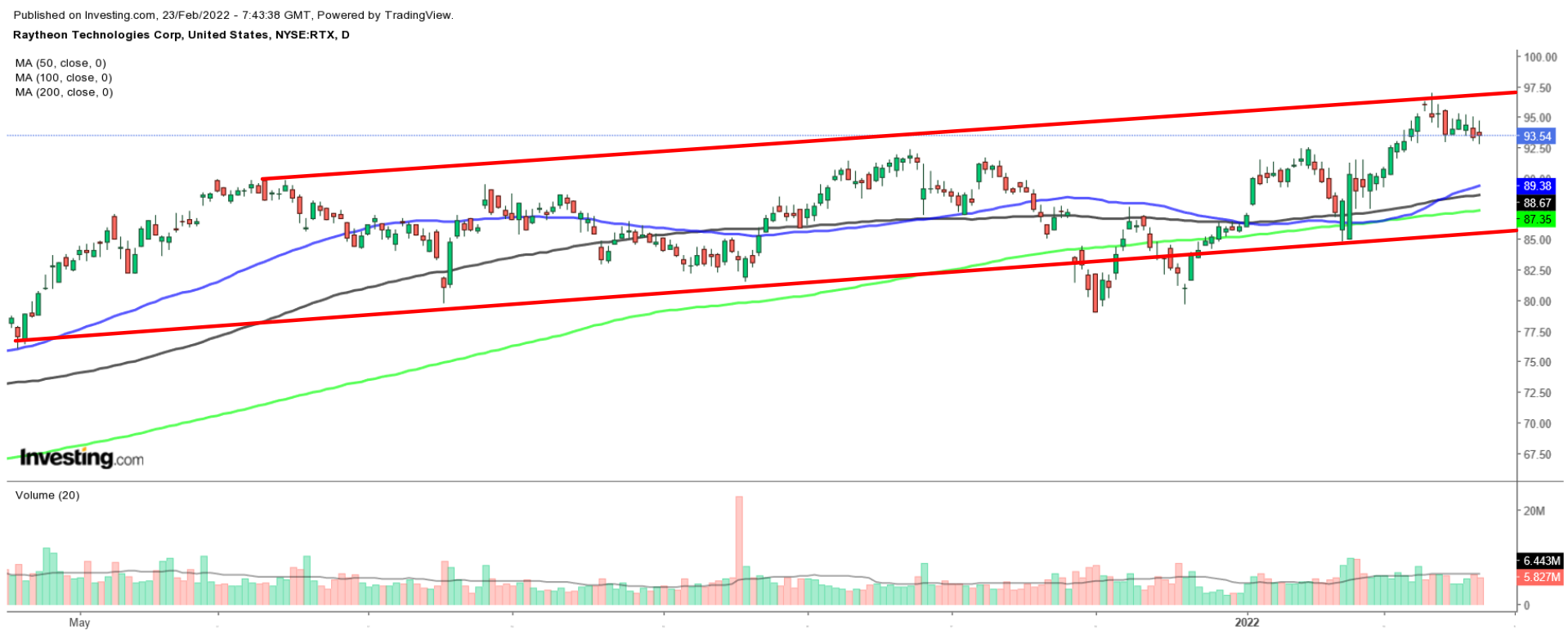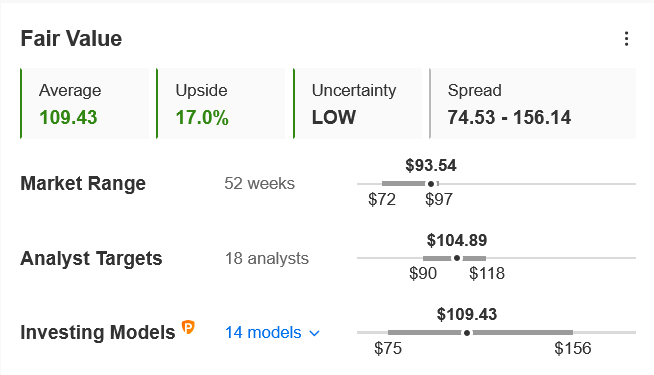3 Defense Company Stocks To Buy As The Russia-Ukraine Crisis Heats Up
Investing.com | Feb 23, 2022 11:08
Tensions between the United States (and its North Atlantic Treaty Organization (NATO) allies) and Russia escalated dramatically this week after Russian President Vladimir Putin recognized the independence of two breakaway regions in Eastern Ukraine. Putin also deployed Russian troops into the separatist regions, fueling fears that the tense situation will erupt into a full-out war.
Though the Western allies have stepped up sanctions pressure on Russia, the White House has indicated that additional measures will be introduced on Wednesday.
The crisis has exacerbated market jitters, with investors already reeling from higher inflation, impending rate hikes and lower earnings results from some heavily followed growth stock darlings.
However, not all sectors are experiencing a negative hit from the current situation. In particular, given the possibility of an escalating conflict, defense sector shares could receive a positive push to their stock prices.
Here's a brief look at three leading sector stocks we believe would benefit from the ongoing geopolitical tensions.
1. Raytheon Technologies
- Market Cap: $138.9 Billion
- Year-To-Date Performance: +8.7%
Raytheon Technologies (NYSE:RTN) is a major U.S. defense contractor and industrial corporation with core manufacturing concentrations in weapons as well as military and commercial electronics.
The defense giant is the world's largest producer of guided missiles and a leading manufacturer of missile defense systems. Raytheon’s portfolio includes radar networks and ballistic missile interceptors, such as the Patriot missile system. It also makes a wide range of air-to-surface, surface-to-air, air-to-air, and surface-to-surface precision-guided missiles.
RTX has gained 8.7% year-to-date, closing at $93.54 on Tuesday, not far from its recent record of $96.96 touched on Feb. 10. At current levels, the Waltham, Massachusetts-based military contractor has a market cap of $138.9 billion.

As one of the leading global producers of missile defense systems, precision weapons, radars, and command and control systems, Raytheon appears to be a good option for investors looking to hedge against further geopolitical uncertainty in the weeks ahead.
The aerospace and defense company reported fourth quarter profit that topped Wall Street estimates on Jan. 25, though revenue came in lighter than expected due to a mixed performance in its key businesses.
Among its core segments, sales at Missiles & Defense and Intelligence & Space declined 8% and 2%, respectively, from the same period last year, while sales grew 13% at Collins Aerospace—which manufactures aerospace systems for military aircraft—and 15% at Pratt & Whitney, which designs and builds aircraft engines.
Taking that into account, RTX stock could see an increase of around 17% in the next 12 months, according to the InvestingPro model, bringing it closer to its fair value of $109.43 per share.

Source: InvestingPro
2. Lockheed Martin
- Market Cap: $105.1 Billion
- Year-To-Date Performance: +8.6%
Lockheed Martin (NYSE:LMT) is one of the world’s leading companies in the aerospace, military support, security, and technologies industry. It is best known as the lead developer and manufacturer of a wide range of military aircraft, including the F-16, F-22, and F-35 fighter jets, of which the U.S. military and its NATO allies are the primary buyers.
The stock has gained 8.6% so far in 2022, far outpacing the comparable returns of both the Dow Jones Industrial Average and the S&P 500 over the same timeframe, as hostilities between Western powers and Russia escalate.
Lockheed shares—which hit a record peak of $442.53 in February 2020—ended at $386.20 yesterday, earning the Bethesda, Maryland-based aerospace and defense giant a valuation of $105.17 billion.
We expect Lockheed shares to continue their march higher in the weeks ahead, considering the defense contractor’s position as a global manufacturing leader of an assortment of military goods and advanced technologies, which is, in addition to fighter jets, includes combat ships, hypersonic missiles, and missile defense systems.
Lockheed reported solid fourth quarter results on Jan. 25, topping expectations for both earnings and revenue thanks to a strong performance in its aeronautics and defense businesses.
Aeronautics' sales rose 6% year-over-year to $7.12 billion, powered by higher deliveries of its F-35 fighter jet, which is Lockheed's biggest growth driver. The stealth combat aircraft accounts for about a third of the company's total revenue.
Meanwhile, Lockheed's thriving missiles and fire control unit, which makes missile defense systems, such as the Terminal High Altitude Area Defense (THAAD), was one of its best-performing units in its most recent quarter, with sales growing 12% to $3.22 billion.
Indeed, the quantitative models in InvestingPro point to a gain of roughly 32% in LMT stock from current levels over the next 12 months, bringing shares closer to their fair value of $510.90.
Source: InvestingPro
3. Northrop Grumman
- Market Cap: $61 Billion
- Year-To-Date Performance: +1%
One of the biggest weapons manufacturers and military technology providers in the world, Northrop Grumman (NYSE:NOC) holds the largest share of the global drone market. As part of its offerings, Northrop makes the $120 million RQ-4 Global Hawk, which is widely used by the U.S. Air Force and NATO member states. It also designs and produces the RQ-180 stealth drone that can evade radar.
Additionally, Northrop is known for its B-2 stealth bomber line. It currently leads the development of the B-21 Raider, a long-range, stealth bomber capable of delivering both conventional and thermonuclear weapons. It is also investing in hypersonic weapons projects as well as hypersonic defense systems.
NOC—which is up 1% so far in 2022 and 31.4% in the last 12 months—closed at $390.73 last night, within sight of its all-time high of $408.97 touched on Jan. 19. At current valuations, the West Falls Church, Virginia-based aerospace and defense technology company has a market cap of $61 billion.
Northrop Grumman is a major subcontractor on Lockheed's F-35 as well as a leading producer of highly sophisticated drones. It is well-positioned to profit from the current elevated tensions between the West and Russia.
The defense contractor reported mixed fourth quarter financial results on Jan. 27, missing revenue estimates largely due to the negative impact of labor shortages and supply chain issues.
Nonetheless, Northrop’s total profit for 2021 more than doubled to $7 billion, as it benefits from growing global government and military defense budgets amid the current environment.
Not surprisingly, NOC stock is undervalued at the moment according to InvestingPro models and could see an upside of roughly 26.5% over the next 12 months to its fair value of $494.32 per share.
Source: InvestingPro
Trading in financial instruments and/or cryptocurrencies involves high risks including the risk of losing some, or all, of your investment amount, and may not be suitable for all investors. Prices of cryptocurrencies are extremely volatile and may be affected by external factors such as financial, regulatory or political events. Trading on margin increases the financial risks.
Before deciding to trade in financial instrument or cryptocurrencies you should be fully informed of the risks and costs associated with trading the financial markets, carefully consider your investment objectives, level of experience, and risk appetite, and seek professional advice where needed.
Fusion Media would like to remind you that the data contained in this website is not necessarily real-time nor accurate. The data and prices on the website are not necessarily provided by any market or exchange, but may be provided by market makers, and so prices may not be accurate and may differ from the actual price at any given market, meaning prices are indicative and not appropriate for trading purposes. Fusion Media and any provider of the data contained in this website will not accept liability for any loss or damage as a result of your trading, or your reliance on the information contained within this website.
It is prohibited to use, store, reproduce, display, modify, transmit or distribute the data contained in this website without the explicit prior written permission of Fusion Media and/or the data provider. All intellectual property rights are reserved by the providers and/or the exchange providing the data contained in this website.
Fusion Media may be compensated by the advertisers that appear on the website, based on your interaction with the advertisements or advertisers.